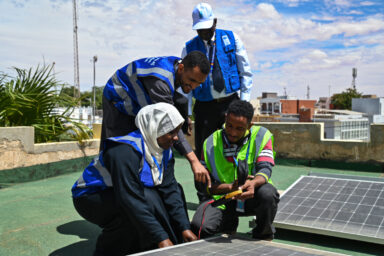How a Smog-Bound City Cut Dangerous Air Pollution
PICKS are stories from many sources, selected by our editors or recommended by our readers because they are important, surprising, troubling, enlightening, inspiring, or amusing. They appear on our site and in our daily newsletter. Please send suggested articles, videos, podcasts, etc. to picks@whowhatwhy.org.
|
Listen To This Story
|
How a Smog-Bound City Cut Dangerous Air Pollution (Maria)
The author writes, “In Santiago, this winter was different. The mountains surrounding the city – the same ones that usually trap smog and turn it into a ‘pressure cooker’ – were visible more days than usual. For nearly 30 years, Chile’s capital has been experimenting in how to reduce air pollution; in the last few years the work has at last begun paying dividends and 2025 was the third best year in terms of fewest hours of critical pollution episodes since the first atmospheric prevention and decontamination plan in 1997.”
Pope Leo XIV Says Those Against Abortion but in Favor of Death Penalty Are ‘Not Really Pro-Life’ (DonkeyHotey)
From CBS News: “For the first time since being elected in May, Pope Leo XIV waded into US politics, criticizing those who say they’re against abortion but support the death penalty, saying that’s ‘not really pro-life.’ Leo, a Chicago native, was asked late Tuesday about plans by Chicago Cardinal Blase Cupich to give a lifetime achievement award to Illinois Sen. Dick Durbin for his work helping immigrants. The plans drew objection from some conservative US bishops, given the powerful Democratic senator’s support for abortion rights. Leo called first of all for respect for both sides, but he also pointed out the seeming contradiction in such debates.”
Inside ‘Alligator Alcatraz,’ Where Detainees’ Uniform Color Is Based on Criminal History (Reader Steve)
The author writes, “Detainees must watch an orientation video upon arrival. They are allowed only to keep prayer books, glasses, dentures, wedding rings and small personal religious items like a rosary, and they wear sandals with their uniform. They’re given soap, shampoo, deodorant, toothpaste and a toothbrush, as well as sheets, a blanket, mattress and towel. Among items considered contraband are recording devices, like cameras and cell phones, and identity documents such as passports and birth certificates, since Immigration and Customs Enforcement may use the documents as evidence, according to the handbook.”
It’s Time for the States To Start Investigating Trump (Dana)
From The Bulwark: “There is, however, a major force in American politics, untested so far in this administration, with the power and authority to hold our reckless commander in chief accountable. States have the right—and the obligation—to investigate the Trump administration. And they don’t have to stop there. They can propose constitutional amendments, federal legislation, and state legislation. All this and more they ought to do because Trump’s second term is spiraling out of control.”
This Is How the AI Bubble Will Pop (Sean)
The author writes, “Some people think artificial intelligence will be the most important technology of the 21st century. Others insist that it is an obvious economic bubble. I believe both sides are right. Like the 19th century railroads and the 20th century broadband Internet build-out, AI will rise first, crash second, and eventually change the world. The numbers just don’t make sense. Tech companies are projected to spend about $400 billion this year on infrastructure to train and operate AI models. By nominal dollar sums, that is more than any group of firms has ever spent to do just about anything.”
Uncovering the Secret Lives of Cacti and Fungi in the Sonoran Desert (Laura)
From Inside Climate News: “With sizzling temperatures and a parched climate, it can be hard to survive in the Sonoran Desert of Arizona. But some species have evolved to thrive in this extreme environment, including the iconic saguaro cactus. Part of the reason for this prickly plant’s success is its intimate relationship with a smaller—but similarly mighty—desert player: fungi. A team of researchers is working to uncover the mysterious symbiotic relationship that mycorrhizal fungi have formed with the cacti, which are increasingly threatened by climate change and urban development.”




